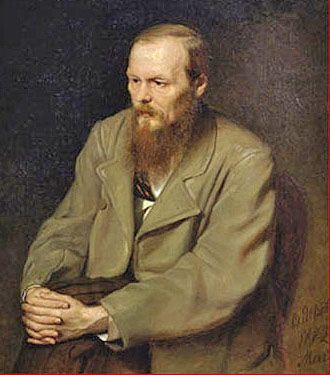![]()
What you must do in this unit
- Read the textbook chapter 31.
- Check the remarks by Professor Evans on the Russian Golden Age and the Russian Silver Age.
- Study the Questions to Consider and the Key Terms for the Unit.
Submit
- Submit the required Reflective paragraph (20 points).
- Post in the discussion board a comment on what you found most interesting about your study of history in HIS 241 and include a suggestion for improving the course. Suggestions are very valuable as we are always making revisions to the course (5 points).
- IMPORTANT, as we come to the end of the course: To earn a grade of A, B, C or D, you must complete all required assignments, including the group project, and the two exams and earn the required number of points in the course.
What you can do this unit
- Professor Joseph Frank worked for over twenty-five years to publish his definitive, five-volume biography of Dostoevsky (Dostoevsky: The Seeds of Revolt, 1821-1849; The Years of Ordeal, 1850-1859; The Stir of Liberation, 1860-1865; The Miraculous Years, 1865-1871; The Mantle of the Prophet, 1871-1881), truly a magnificent work. Read some of Frank's reflections on his long, and continuing, study of Dostoevsky in *.doc or *.PDF format.
- Read my note about Tolstoi's idea on history presented in his great novel, War and Peace, which is about 1812.
Some videos that you can watch for this unit
- Stanford Scholar on Dostoevsky's Continued Relevance
- Leo Tolstoy - on film
- Understanding Tolstoy's Humanity
- The Mighty Five
- Sir Isaiah Berlin - Ivan Turgenev's 'A Fire At Sea' (1/3)
- Five Great Russian Writers Ivan Turgenev by Jason Burns Samuel Zwemer Theological Seminary
- BPO A Fifth of Tchaikovsky Pre-Concert Lecture with JoAnn Falletta
- Professor Carol, Russian Bells
- For extra credit please suggest to your instructor a relevant video for this unit of the course. Send the title of the video, the URL and a brief explanation of why you find the video interesting and applicable to the material that is being studied in this unit.
Extra Credit Options
- For up to 25 points of extra credit, watch Anna Karenina (1967) and write a one-page paper about why your instructor thought that the film was so bad.
- For up to 25 points of extra credit, watch Voina i Mir (War and Peace), if you dare. Watch instead Love and Death (1975), and write a one-page paper assessing Woody Allen's portrait of Russia in the age of the Napoleonic wars.
- For up to 25 points of extra credit, compare and contrast the work of the mighty three (Tolstoi, Dostoevskii and Turgenev) in a one-page paper. This might be worth a lot more depending on how good your comparison is; I might accept longer than one page on this.
- For up to 25 points of extra credit, in a one-page paper, identify some of the unifying traits of the work of the Mighty Five (Milii Balakirev, Cesar Cui, Modest Mussorgskii, Aleksandr Borodin and Nikolai Rimskii-Korsakov).
- For up to 25 points of extra credit, identify some of the salient characteristics of the work of Ilya Repin and the Peredvizhniki in a one-page paper.
- For up to 25 points of extra credit, read Lev Tolstoi (1828-1910), Anna Karenina (1873-78) and write a one-page paper about his critique of Russian society.
- For up to 25 points of extra credit, read Lev Tolstoi (1828-1910), Death of Ivan Il'ich (1882) and write a one-page paper assessing Tolstoi's criticism of Russian society.
- For up to 25 points of extra credit, read Fedor Dostoevskii (1821-81), Crime and Punishment (1866) and write a one-page paper, Why was this the "true" Russian novel.
- For up to 25 points of extra credit, read Fedor Dostoevskii (1821-81), Idiot (1868) and write a one-page paper in which you explain why this is Professor Evans' favorite Dostoevskii novel.
- For up to 25 points of extra credit, read Fedor Dostoevskii (1821-81), Brothers Karamazov (1878-80) and write a one-page paper, "Who was the Grand Inquisitor?"
Unit Learning Objectives
- Upon successful completion of this unit and with the completion of your reflective paragraph, you will have demonstrated your mastery of the course goals and objectives, which are
- Establish a chronology of historical events in Russia before 1900.
- Obtain a knowledge of the historical geography of Russia up to 1900.
- Define the importance of key individuals and developments in Russian history before 1900.
- Identify the social, economic and political forces at work in the historical development of medieval and imperial Russia.
- Recognize and describe the significance of some of the cultural achievements in medieval and imperial Russia.
- Analyze complex Russian historical sources and materials and reach conclusions based on interpretations of those materials.
